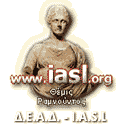10th International Congress on Sports Law
Athens, Greece on 25-27 November 2004
The 10th IASL International Congress of Sports Law was held on 25-27 November 2004 in the main building of the University of Athens (Ceremony Hall, I. Dracopoulos Auditorium) and was an organizational and scientific success. The Hellenic Centre of Research on Sports Law and the Organisational Committee of the Congress managed to gather the most distinguished scientists on the field of Sports Law and 220 participants from all over the world.
The subject of the Congress was “Sports Law: Application and Olympic Games”. There were also specific units about “Sport Institutions and Sports Law”, “Solving Sport Disputes”, and “Sports Law and the Olympic Games”.
The Opening Ceremony was held on Thursday, 25 November, in the Ceremony Hall of the University of Athens, hosted by the Vice Chancellor of the University of Athens, Prof. D. Asimakopoulos. The opening of the congress was declared by Greek Deputy Secretary for Culture, Fani Palli-Petralia, who also awarded the prize “Aisymnetes”, established by the Hellenic Centre of Research on Sports Law as a scientific distinction for the research on Sports Law. The prize was awarded to James A.R. Nafziger, Thomas B. Stoel Professor of Law, Willamette University, USA, for his special contribution to the development of the science of sports law.
Main speaker of the Opening Ceremony was the Assistant Professor of the University of Athens, D. Panagiotopoulos (“Lex Sportiva: sport institutions and rules of law”). In his lecture he referred to the necessity of the existence of rules for the regulation of sport at a national and international level and to the problems and legal conflicts these rules may result in.
The lectures of the congress were held on Friday, 26, and Saturday, 27 November, at the I. Dracopoulos Auditorium at the Main Building of the University of Athens. The presentations of the speakers and the discussion that followed gave rise to several important statements for the further development of Sports Law as a scientific discipline. Lex Sportiva was defined as the law of sport regulation and distinguished from the more extended scope of regulation and application field of Sports Law. The need for constant state control and scrutiny of the enactment and the application of the Lex Sportiva rules by sport federation was also underlined. Moreover, there was a discussion about the necessity of the application of the principle of “fair trial” on procedures before Dispute Resolution Organs and Sport Courts, the possibility to establish an independent International Sport Court, its procedural rules and the extent of its jurisdiction. Finally, the Olympic Games as an event of worldwide significance and of major financial, cultural and societal importance need to be examined under the perspective of initiating a more active state control on its organization, as a response to the monopoly of the organizational authorities of the IOC. The benefit of a common state action in this field would be the more effective dealing with problems that the modern Olympic Games face, such as doping, sponsoring, over-commercialisation, and exploitation of athletes.
Assistant Professor D. Panagiotopoulos, President of the Hellenic Centre of Research on Sports Law stated: “I feel extremely satisfied that a Congress of such importance took place in Greece. This fact also acknowledges the contribution of the Hellenic Centre of Research on Sports Law 15 years after its establishment and stresses its assistance to the establishment and function of the International Association on Sports Law as a prestigious international association.”



